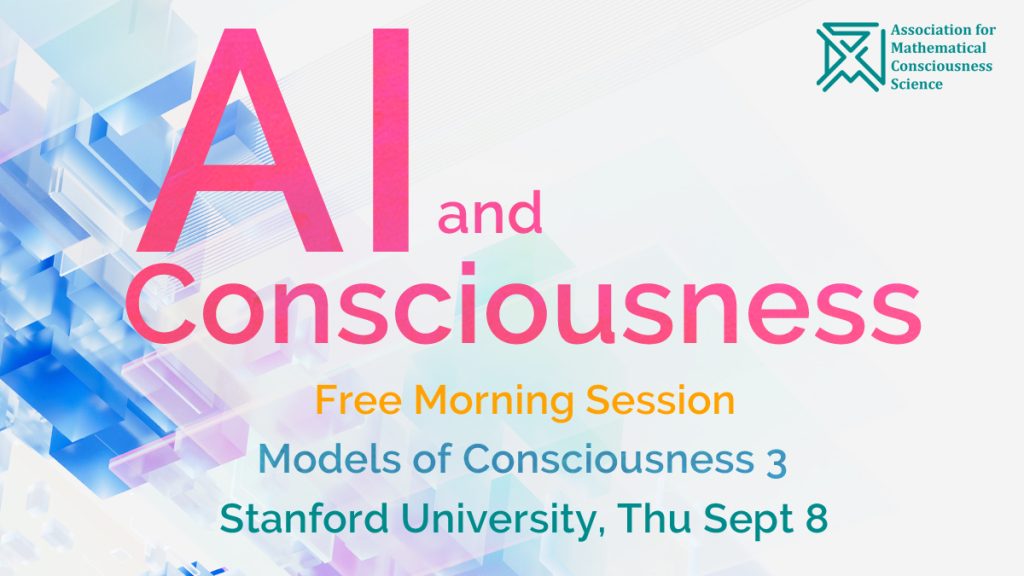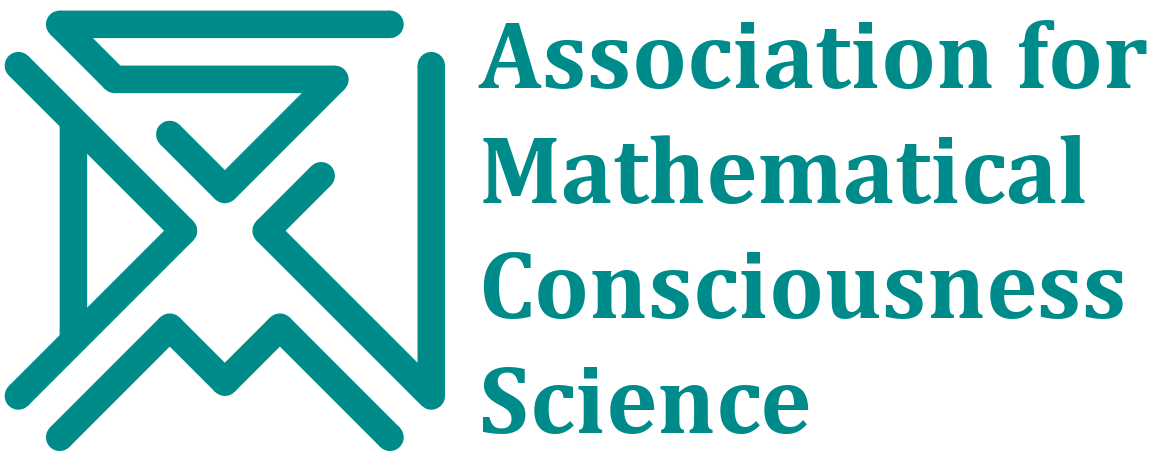Models of Consciousness 3
Stanford University, 2022
Join our free Consciousness and AI Session on Thursday morning!
We cordially invite those living in the Bay Area to attend our Consciousness and AI session on Thursday morning free of charge. The session comprises four talks that illuminate the relation between AI and Consciousness, as well as three parallel discussion sessions to dig into the open problems and new ideas. In case of interest, please RSVP as described below.

Details
The session takes place on Thursday, September 8, 2022, at Stanford’s Frances C. Arrillaga Alumni Center, from 9:00 am to 12:30 am.
Times are in PT (Stanford Time AM)
9:00 – 10:00
Prof. Ryota Kanai
Consciousness meets AI for a new paradigm
I will present our current research exploring potential connections between consciousness and intelligence. In this paper we examined how to combine theories of consciousness with modern deep learning techniques to translate high-level concepts from consciousness research into more concrete computational concepts. Among the theories we considered were Global Workspace Theory (GWT), Information Generation Theory (ITG), and Attention Schema Theory (AST). From this effort, one of the key conclusions is that consciousness has evolved into a platform for general-purpose intelligence. In this talk, I will present a reinterpretation of the GWT as a shared latent space among multimodal specialist modules and outline a roadmap for implementing a Global Latent Workspace (VanRullen & Kanai, 2021) using deep learning techniques, such as an unsupervised translation of representations across latent spaces. With our re-formulation of GWT, we will discuss the functional merits of having a global workspace as well as its implications for neuroscientific research into the brain and the development of brain-to-brain communication technologies.
10:00 – 10:20 Coffe Break
10:20 – 10:45
Dr. Arthur Juliani
On the link between conscious function and general intelligence in
humans and machines
In popular media, there is often a connection drawn between the advent of awareness in artificial agents and those same agents simultaneously achieving human or superhuman level intelligence. In this work, we explore the validity and potential application of this seemingly intuitive link between consciousness and intelligence. We do so by examining the cognitive abilities associated with three contemporary theories of conscious function: Global Workspace Theory (GWT), Information Generation Theory (IGT), and Attention Schema Theory (AST). We find that all three theories specifically relate conscious function to some aspect of domain-general intelligence in humans. With this insight, we turn to the field of Artificial Intelligence (AI) and find that, while still far from demonstrating general intelligence, many state-of-the-art deep learning methods have begun to incorporate key aspects of each of the three functional theories. Given this apparent trend, we use the motivating example of mental time travel in humans to propose ways in which insights from each of the three theories may be combined into a unified model. We believe that doing so can enable the development of artificial agents which are not only more generally intelligent but are also consistent with multiple current theories of conscious function.
10:45 – 11:10
Joscha Bach
Virtualism as a perspective on the functionality and phenomenology of
consciousness
The “hard problem of consciousness” refers to the difficulty of reconciling phenomenal experience with physical mechanisms, and has led a number of theorists to argue that computational simulations may never exhibit the phenomenology of consciousness. Conversely, the virtualist position maintains that consciousness is best characterized as a simulated property, instead of a property of physical systems, and that we can study the conditions under which systems that are capable of producing simulation models in the service of control will self report awareness of content, mode of attention, reflexive awareness and first person perspective. Functionally, consciousness is understood as a control model of attention in a self organizing information processing agent, tasked with constructing a perceptual scene graph and facilitating attentional learning and compositional reasoning. Each of these concepts will be briefly discussed and operationalized in the context of a cognitive architecture perspective, combining predictive perception, agency, self modeling, homeostatic motivation, and working memory construction via selective attention. Virtualism is not necessarily a new and unique position, but shows significant overlap with eg. Michael Graziano’s Attention Schema Theory, Bernard Baars’ and Stanislas Dehaene’s Global Workspace Theory Thomas Metzinger’s Self Model Theory of Subjectivity, and Yoshua Bengio’s Consciousness Prior.
11:10 – 11:35
Ruairidh Battleday
Towards an NP-hard model of consciousness
Is consciousness computable? Several papers have recently proposed a deflationary, normative account of consciousness as an illusion resulting from first modeling one’s own attentive process and then inaccurately representing the result. To take the idea of modeling seriously, we must consider the computational implications of such a theory. In particular, we can ask what computational complexity class each of these processes must belong to, and speculate on whether a self-modeling process—let alone a brain—could support such computation. Famous examples have been given that argue that at least some cognition abilities are not computable by a Turing machine. Much more commonly, many transformations in perceptive and cognitive phenomena can be shown to be NP-hard. In this paper, we analyze these various arguments, and put forward the conditions that an intelligent system must fulfil to be conscious, and yet still implementable on a computer. The latter is critical for not only the potential creation of artificial intelligence based on the digital computer as its model of computation, but also for deciding which aspects of the “consciousness problem” will be amenable to scientific modeling and pursuit.
11:35 – 12:30
Discussion Sessions
Discussion of open problems and new ideas in the context of AI and consciousness. The topics are fixed on site depending on the interests of participants and speakers.
Please don’t forget to RSVP!
If you would like to join this session, please RSVP by sending an email to organisers@models-of-consciousness.org.
Please note that if you wish to attend other parts of the conference, registration is necessary.
How to find the session?
For details on the conference, including the location, please see our conference booklet:

